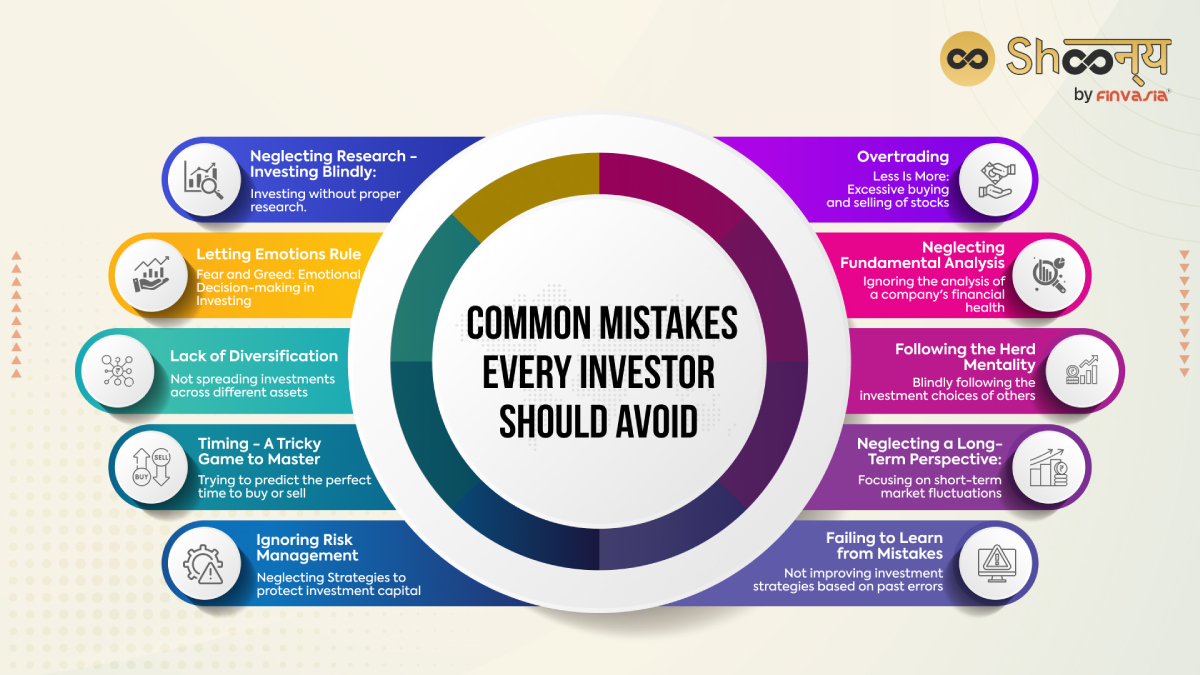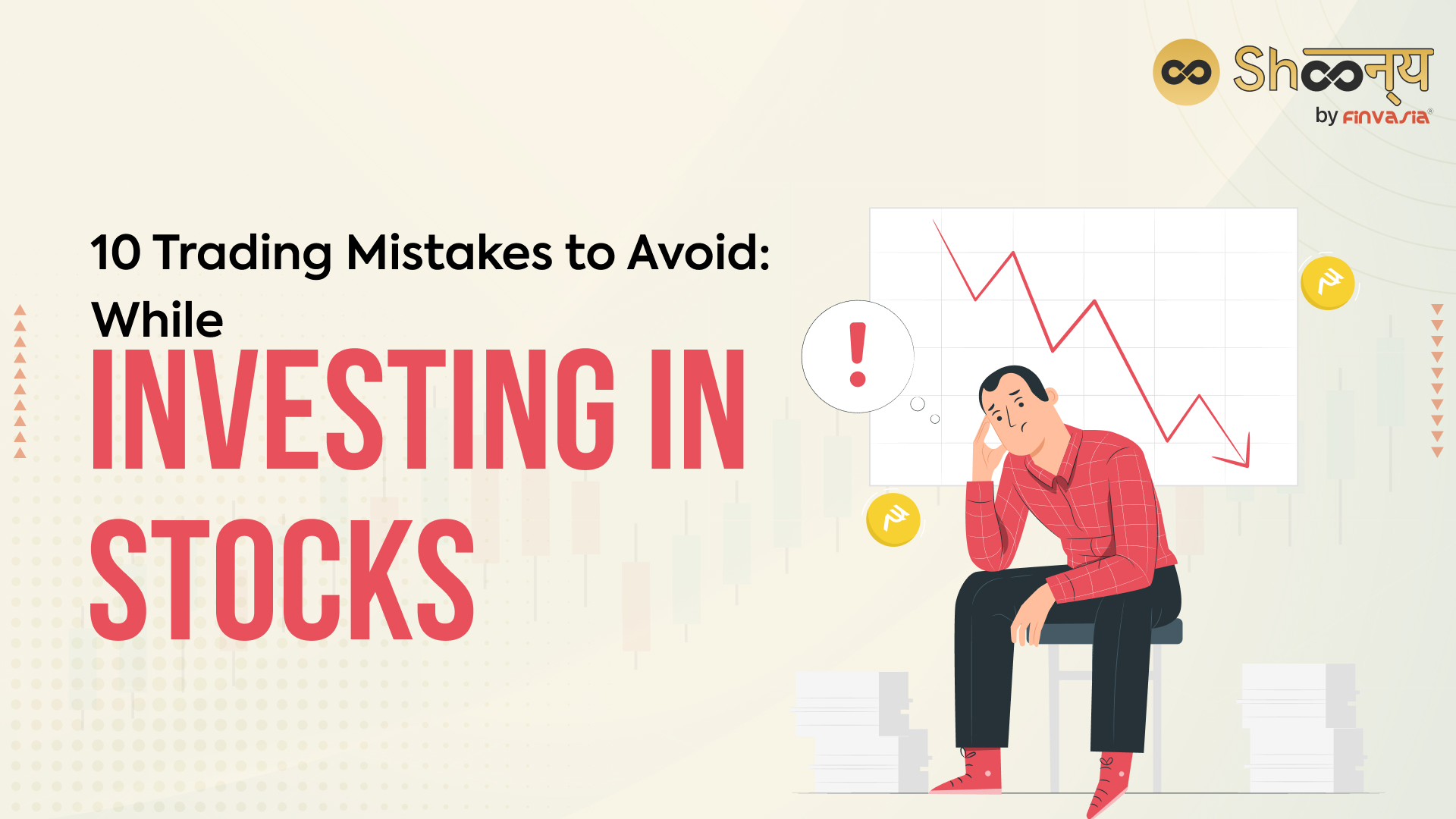Overview
Stock market trading can be rewarding. However, you need to avoid some common trading mistakes that can derail your investment goals.
In this article, we have highlighted the top investment mistakes that you can avoid to ensure stable and consistent investment returns once you start your online trading journey.
Let us look at some common investing mistakes that you could avoid

- Common Investing Mistake #1: Neglecting Research & Investing Blindly:
Whether you are a beginner or a professional trader, conducting thorough research is essential before investing in any stock. Skipping this step is like taking a leap in the dark without knowing where you’ll land.
Solution: As a responsible stock market investor, you should analyse the company’s financial health and the industry trends to keep yourself up to date with the market trends. By arming yourself with stock market knowledge, you can avoid investing blindly.
- Common Investing Mistake #2: Letting Emotions Rule – Fear and Greed:
Emotions like fear and greed can cloud your judgment and lead to poor trading decisions. Fear can push you to sell stocks during a temporary market dip, while greed may drive you to chase hot stocks without considering their long-term potential.
Solution: Keep emotions in check and make decisions based on logic and analysis. Create a trading plan with predetermined entry and exit points. You can even avoid making impulsive decisions by relying on AI tools that can offer helpful predictions on individual stocks and signals.
- Common Investing Mistake #3: Lack of Diversification – Don’t Put All Your Eggs in One Basket:
Making an abrupt decision by putting all your money into a single stock or asset is a risky move. If that stock takes a downturn, your entire investment will suffer. It is always better to create a risk-return balance to protect yourself from bad investments.
Solution: Portfolio Diversification is the key. You must smartly diversify your portfolio by investing in different stocks across various sectors. This spreads out your risk and helps cushion the impact of poor-performing stocks. Ensure your portfolio balances and aligns with your risk tolerance and investment goals. Remember to follow portfolio rebalancing regularly to ensure consistency with market volatility.
- Common Investing Mistake #4: Market Timing – A Tricky Game to Master:
Making an effort and trying to time the market perfectly is a challenging task. Even seasoned professionals find it challenging. Instead of obsessing over short-term market movements, focus on a long-term investment strategy.
Solution: Focus on a long-term investment strategy instead of trying to time the market. The PPF (Public Provident Fund), NPS (National Pension Scheme), or post office schemes would be safe investments that would yield benefits over time, regardless of market fluctuations. This approach helps mitigate the risk of making investor mistakes.
- Common Investing Mistake #5: Ignoring Risk Management – Protecting Your Capital:
Risk management is crucial in stock market trading. It is not a one-day skill or a task that you put money in the market and can sit at rest until the day of receiving a return. This forms the worst investment mistake that any investor could make.
Remember, stock market investments are subject to market risks, and it is necessary that you research well and keep reviewing your investments and trades regularly.
Solution: Implement risk management strategies, such as setting stop-loss orders or predetermined exit points for each trade. Regularly assess and adjust your portfolio’s risk exposure based on your risk tolerance, finances, and investment goals. This helps protect your capital and minimise potential losses.
- Common Investing Mistake #6: Overtrading – Less Is More:
Frequent buying and selling of stocks can rack up transaction costs and erode your returns. Avoid the temptation to constantly tinker with your portfolio.
Solution: Avoid excessive trading and focus on quality over quantity. Select a few well-researched investments and give them time to grow. Practice patience and discipline, constantly avoiding the temptation to buy and sell stocks.
- Common Investing Mistake #7: Neglecting Fundamental Analysis – Digging Deeper:
Understanding a company’s fundamentals is crucial before investing, be it intraday or long-term investing. Fundamental analysis involves assessing a company’s financial statements, earnings growth, competitive position, and industry trends.
Solution: Prioritize fundamental analysis before investing. Assess a company’s financial statements, earnings growth, competitive position, and industry trends. This deeper understanding will help you make more informed investment decisions.
- Common Investing Mistake #8: Following the Herd Mentality – Be Your Own Investor:
Blindly following the crowd can lead to bad investment choices. Just because everyone is buying a certain stock doesn’t mean it’s the right choice for you. Conduct your own research, evaluate the merits of each investment opportunity, and make decisions based on your own analysis and risk appetite.
Solution: Consider various perspectives, but ultimately trust your judgment and invest according to your own personal finance needs. You can always take a financial advisor’s help to ensure that you don’t commit common trading mistakes that can hamper your returns.
- Common Investing Mistake #9: Neglecting a Long-Term Perspective – Avoid Short-Sightedness:
Stock market investing is a long-term game. While short-term fluctuations can be unnerving, it’s important to keep your focus on the bigger picture. Don’t let temporary market volatility derail your investment strategy.
Solution: Maintain a long-term perspective and stick to your investment strategy. Don’t let short-term market fluctuations derail your plans. Instead, you must stay focused on your long-term goals and resist the urge to make impulsive decisions based on temporary market movements.
- Common Investing Mistake #10: Failing to Learn from Mistakes – Continuous Improvement:
Nobody is immune to mistakes in the stock market. What matters is how you learn from them. Maintain a growth mindset, analyse your investment decisions, and identify areas for improvement.
Solution: Learn from your mistakes and continuously improve your investment skills. Analyse your investment decisions, identify areas for improvement, and make adjustments accordingly. Adopt a growth mindset and see each mistake as a valuable learning opportunity.
In Conclusion,
You may avoid typical investing blunders and make wise investment selections by considering these crucial considerations.
1. Before buying any stock, do extensive research.
2. Control your emotions and make judgements based on rationality and research.
3. To spread risk, diversify your investments.
4. Instead of attempting to time the market, concentrate on a long-term investing strategy.
5. Use risk management techniques to safeguard your money.
6. Refrain from overtrading and prioritise quality over quantity.
7. Prioritise fundamental research before making a purchase.
8. Rather than heedlessly going along with the mob, base your judgements on your own analysis and risk tolerance.
9. Keep a long-term outlook and refrain from acting rashly in response to short-term market changes.
10. Acknowledge your errors and make constant improvements to your investment skills.
FAQs
Some beginner investing mistakes include neglecting research, failing to diversify portfolios, and making emotionally driven investment decisions. It’s important to approach investing with thorough research and diversify investments.
The biggest mistake a trader should avoid is neglecting risk management strategies. Establishing risk management measures and sticking to a well-defined trading strategy to mitigate potential losses is crucial.
A basic mistake investors often make while entering the stock market is investing without a clear understanding of their risk tolerance and investment goals. This can lead to impulsive decisions and unnecessary losses.
Emotional investing mistakes include making decisions based on fear or greed, being unable to handle market volatility, and allowing short-term market fluctuations to dictate long-term investment strategies.
It’s important to analyse and learn from trade mistakes to overcome them. Develop a disciplined trading approach, practice risk management techniques, and seek guidance from experienced traders or professionals.

